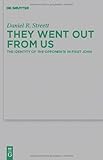
Not a keynote speaker at the conference.
I’m pleased to announce that my paper proposal was accepted for the Houston Baptist University conference on Paul and Judaism, which will be happening March 19-20. Keynote speakers include NT Wright, Beverly Gaventa, and Ross Wagner. There will be breakout sessions with papers related to the theme.
My paper is titled Cursed by God? Galatians 3:13 in Early Jewish Context. Here’s my abstract:
Galatians 3:13, which states that “Christ redeemed us from the curse of the law by becoming a curse for us,” is a traditional crux in Pauline studies. Virtually every word and phrase has been subject to (sometimes tortuous) examination by exegetes and commentators. In this paper, I examine three key elements of the text in order to argue that:
- Paul deliberately says that Christ “became a curse” rather than “became accursed.” His language evokes the OT covenantal threat that sinful Israel would become a curse and a byword among the nations. Paul is not, therefore, claiming that God (or the Law) cursed Christ, as is so often claimed. I adduce two key linguistic parallels from early Greek texts (Protevangelium of James and Acts of Thomas) to demonstrate that “becoming a curse” refers to a loss of social status as opposed to becoming the object of divine wrath.

Probably not an accurate view of second temple Judaism . . .
- Paul does not cite Deut 21:23 in order to establish that everyone who is crucified is divinely cursed. I examine early Jewish (and Christian) readings of Deut 21:23 to establish that no one believed crucifixion per se brought God’s curse on the victim. Indeed, Paul slightly but significantly modifies the wording of the verse (changing κεκατηραμένος ὑπὸ θεου to ἐπικατάρατος) to steer the audience away from this misunderstanding.
- Modern readers miss the point of Paul’s statement because they approach the text with questions about the mechanics of atonement. I urge that the passage should rather be read as a description of the status loss (“becoming a curse”) that Jesus underwent in order to redeem Israel. The passage is thus akin to Phil 2:5–9 and other texts which do not provide a theory of atonement so much as they describe the social texture of Christ’s shameful death.
If you’re a reader, and plan to attend the conference, be sure to say hi!





Pingback: My Paper Presentation for HBU’s “Paul and Judaism” Conference | The Time Has Been Shortened
Pingback: HBU Paul and Judaism Conference Report | καὶ τὰ λοιπά
Pingback: Video for the HBU Pauline Theology Conference | καὶ τὰ λοιπά
Pingback: First Wright now Hays, HBU Continues to Impress | The Time Has Been Shortened
I take it similarly to you. The crucifixion did not make him cursed. I take it as those who end up being crucified are those who were already considered cursed beforehand, due to, in Jesus’ case, being a blasphemer.
Yes! Thanks for your comment.